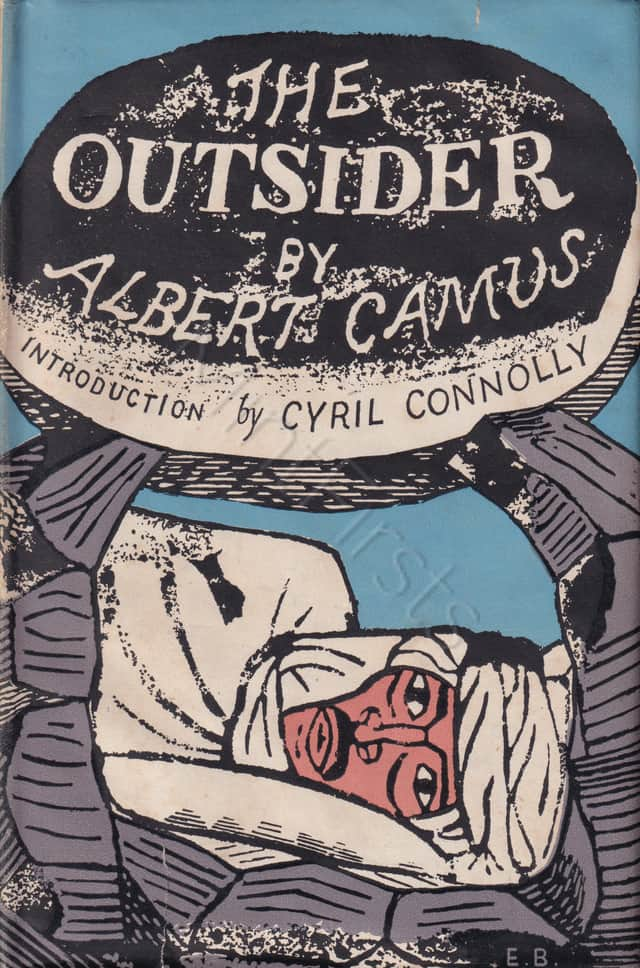Established
2004
Relaunched
2024
Our booksHow we tradeAbout usCredits & thanksYour account
- Home page
- Our books
- How we trade
- About us
- Credits & thanks
- Your account
- Your cart
MENU
The Outsider
First edition in English of Albert Camus's The Outsider

Albert Camus; translated by Stuart Gilbert; introduction by Cyril Connolly
First edition in English. Slim 8vo. Pp. [ii], 104, [2, blank]. Grey-green linen cloth, stamped in gilt to spine. Jacket design by Edward Bawden (6s. net to front flap).
Foxing spots to the text edges, a couple of closed tears to front dust wrapper panel with some trivial soiling to rear, else Fine. Increasingly difficult to locate in a presentable dust wrapper, let alone a complete one. Ephemera tipped in.
Translated from the French by Stuart Gilbert. Camus's first novel, and the first to be published in English, preceding the American edition published by Knopf, and with an introduction by Cyril Connolly not present in the latter.
Begun in Algiers in 1938, it was originally published in 1942 by Éditions Gallimard as L'Étranger. Stuart Gilbert's title choice, The Stranger, was changed at short notice by Hamish Hamilton to The Outsider, for being "more striking and appropriate," but also because Maria Kuncewiczowa's then just published Polish-language novel Cudzoziemka, bore the same title. By the time Knopf were informed of the change, with whom Hamilton shared translator and costs, it was too late for they had already typeset the manuscript using Gilbert's original title.
Ranked No. 1 by Le Monde on its list of '100 Books of the Century'. One of Conolly's 100 Key Books of the Modern Movement. The outwardly simple tale of an office clerk who kills an Arab, "à cause du soleil", and finds himself condemned to death for moral insensibility. Taking the form of a récit or monologue, Camus here dramatizes the ideas behind The Myth of Sisyphus – incessantly pushing his rock to the hill-top, only for it to keep rolling back – or what he termed "the nakedness of man faced with the absurd."
Employing a striking unity between form and content (the first-person narrative, the severely restricted and concrete vocabulary – denuded of adjectives but rich in verbs), the perfect tense or le passé composé employed throughout – all serve to give an authentic directness to Mersault's character, who exists in a 'continuous present,' or in the grip of immediate sensual sensations. Refusing to conform to societal norms or justify his actions, he is sentenced to death, yet feels innocent: "I wasn't conscious of any 'sin'; all I knew was that I'd been guilty of a criminal offence."
In the preface to a mid-50's American edition of The Stranger, dated January 8, 1955, Camus states: "I summarized The Stranger a long time ago, with a remark I admit was highly paradoxical: 'In our society any man who does not weep at his mother's funeral runs the risk of being sentenced to death. I only meant that the hero of my book is condemned because he does not play the game.' [How does Meursault not] play the game[?] The reply is a simple one; he refuses to lie."
Holding fast to his innocence, Meursault attains at the end of his life a peace of mind, a Buddhist-like enlightenment, a state of nirvana: "[G]azing up at the dark sky spangled with its signs and stars, for the first time, the first, I laid my heart open to the benign indifference of the universe." In the same preface, Camus mischievously but not entirely tongue in cheek sums up: "I had tried to draw in my character the only Christ we deserve."
Awarded the Nobel Prize for Literature in 1957. Basis for the 1967 Luchino Visconti film starring Marcello Mastroianni and Anna Karina. "A book so well written and profoundly disturbing that it is in a class by itself, seldom have I read a work which says so much in so short a space," John Betjeman.
[Carroll, David. Albert Camus the Algerian: Colonialism, Terrorism, Justice. Columbia University Press. p. 27]
edition
first in English
format
hardback
scarcity
scarce
publisher
Hamish Hamilton
published in
London
publication year
1946
ISBN
not assigned
height × width
19 × 12.5 cm
genre
literary fiction
language
English
binding style
cloth
binding state
original binding
condition . . .
near fine
of jacket
near fine
GBP£ 1,100
EUR€ 1,280
USD$ 1,470
ref.K7L 3UY